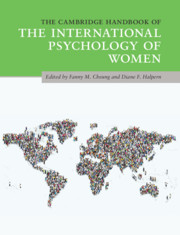Book contents
- The Cambridge Handbook of the International Psychology of Women
- The Cambridge Handbook of the International Psychology of Women
- Copyright page
- Dedication
- Contents
- Figures
- Tables
- Contributors
- Acknowledgments
- Section 1 The Underpinnings of Sex and Gender and How to Study Them
- Section 2 Developmental Perspectives of the International Psychology of Women
- Section 3 Cognitive and Social Factors
- 10 Sex, Gender, and Intelligence
- 11 At the Crossroads of Women’s Experience
- 12 Gender and Personality Research in Psychology
- 13 Selfhood and Self-Construal
- 14 Cultural Influences on Body Image and Body Esteem
- 15 The Not So Subtle and Status Quo Maintaining Nature of Everyday Sexism
- 16 A Gendered Light on Empathy, Prosocial Behavior, and Forgiveness
- 17 The Impact of Gender and Culture in Consumer Behavior
- 18 Evolutionary Roots of Women’s Aggression
- Section 4 Work and Family Issues
- Section 5 Inequality and Social Justice
- Section 6 Health and Well-Being
- Epilogue Some Final Thoughts and Take-Home Messages
- Index
- References
11 - At the Crossroads of Women’s Experience
Insights from and Intersections between Motivation, Emotion, Gender, and Culture
from Section 3 - Cognitive and Social Factors
Published online by Cambridge University Press: 20 July 2020
- The Cambridge Handbook of the International Psychology of Women
- The Cambridge Handbook of the International Psychology of Women
- Copyright page
- Dedication
- Contents
- Figures
- Tables
- Contributors
- Acknowledgments
- Section 1 The Underpinnings of Sex and Gender and How to Study Them
- Section 2 Developmental Perspectives of the International Psychology of Women
- Section 3 Cognitive and Social Factors
- 10 Sex, Gender, and Intelligence
- 11 At the Crossroads of Women’s Experience
- 12 Gender and Personality Research in Psychology
- 13 Selfhood and Self-Construal
- 14 Cultural Influences on Body Image and Body Esteem
- 15 The Not So Subtle and Status Quo Maintaining Nature of Everyday Sexism
- 16 A Gendered Light on Empathy, Prosocial Behavior, and Forgiveness
- 17 The Impact of Gender and Culture in Consumer Behavior
- 18 Evolutionary Roots of Women’s Aggression
- Section 4 Work and Family Issues
- Section 5 Inequality and Social Justice
- Section 6 Health and Well-Being
- Epilogue Some Final Thoughts and Take-Home Messages
- Index
- References
Summary
The purpose of this chapter is to discuss research in motivation, self-regulation, and emotion that includes gender as a variable. Specifically, we propose using an intersectionality perspective and a culturally situated understanding of women’s motivational and emotional experiences, and describe data from our labs in Germany and Singapore in order to illustrate this position. Our findings indicate that women’s motivational experience in achievement domains is tied to avoidant motivation and their lower ability to self-regulate negative emotion in the face of goal difficulties or goal failure. Compared to men, women’s more fearful enactment of the implicit achievement motives is related to their adoption of a lower self-attributed achievement motive, which, in turn, lowers women’s well-being. We discuss how cultural norms and gender socialization lead to a complex interplay of parenting, social-normative, and personality systems and processes that contribute to a different motivational and emotional experience for men versus women.
Keywords
- Type
- Chapter
- Information
- The Cambridge Handbook of the International Psychology of Women , pp. 153 - 166Publisher: Cambridge University PressPrint publication year: 2020
References
Suggested Readings

Joyce S. Pang is currently an Associate Professor of Psychology at Nanyang Technological University, Singapore. As a personality psychologist, she is interested in the assessment of individual differences and in making finer distinctions between personality dimensions in order to increase theoretical understanding of how personality affects behavior. Specifically, she adopts a person x situation perspective to understand how individual differences in motivation predict different reactions within different social contexts, which in turn lead to important personal and social outcomes. She is particularly interested in the implicit motives for achievement, power, and affiliation: how to measure them, make differentiations between them, and determine how individual differences in these motives affect performance, health, and well-being. Pang was born and raised in Singapore. She attended Smith College in Massachusetts for her BA and obtained her PhD from University of Michigan. She picked up Argentine tango in graduate school, and has danced ever since. After she obtained tenure, she took a short leave of absence to spend a couple months in Argentina learning more about the dance. She is currently living and working in Switzerland, and expects to be there for another two years.

Nicola Baumann is a Full Professor at the University of Trier, Germany. She did her diploma, PhD, and habilitation (the German postdoc qualification to gain tenure) at the University of Osnabrück. She has held research fellowships at the University of Rochester, New York (1999–2000), the Victoria University of Wellington, New Zealand (2014–2015), and the University of Colorado at Boulder (2019). Baumann’s research on implicit motives, self-regulation, and self-determination is located at the intersection of personality, motivation, cognition, and social psychology. She investigates the “what” (what moves people to action) and “how” (how people regulate their action) of human goal striving from the broader perspective of Personality Systems Interactions (PSI) theory. In addition to her scientific achievements, she has worked as an applied psychologist and nurtures the exchange between research and practice.
Baumann was born and raised in Germany. She had four one-year stays abroad: 1983–1984 University High School of Northern Colorado, USA (at age 16); 1999–2000 University of Rochester, New York; 2014–2015 Victoria University of Wellington, New Zealand; and 2019 University of Colorado at Boulder, Colorado. At the University of Osnabrück, there was a good mix of colleagues from the USA and Russia, allowing the integration of very different approaches to science.

